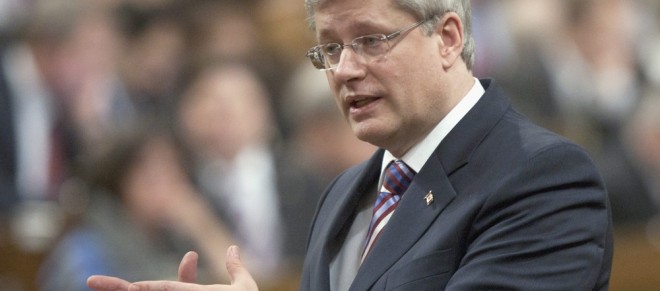The Commons: Tomorrow’s problem
Climate change can wait
Canadian Prime Minister Stephen Harper responds to a question during question period in the House of Commons in Ottawa, Tuesday December 13, 2011. THE CANADIAN PRESS/Adrian Wyld
Share
The Scene. Turning to the English portion of her remarks, Nycole Turmel attempted to round on the Prime Minister.
“The Conservatives are turning their backs on the world. The Conservatives are betraying future generations. They have set up bogus homemade targets and are not even a quarter of the way toward meeting this lame attempt at saving face,” she ventured in her particular way. “When will the Prime Minister take climate change seriously?”
This question was almost entirely rhetorical and almost definitely futile, but it was almost surely the query the NDP wanted on the evening news—a furious condemnation wrapped in a plaintive cry.
The Prime Minister was quite happy for the opportunity to stand and speak seriously.
“Mr. Speaker, in terms of climate change, we are pursuing policies domestically, nationally and internationally. We are working for the creation of an international protocol that will include all major emitters,” he declared. “What this government does not favour, what this government has never favoured and has been very clear on is we do not agree with a protocol that only controls a little bit of global emissions, not enough to actually make any difference but enough to transfer Canadian jobs overseas. We will never agree to that.”
Therein surely lies something like the truth of the matter. However much confronting climate change might result in companies relocating their operations elsewhere, it is, in the shorthand of the moment, “jobs” that matter right now. As Michelle Rempel explained to Joyce Murray yesterday, “With regard to the fossil of the year award, the member opposite should know that the real award that counts is that our country sits on top of the G7 with regard to economic growth and job creation.” So there and so true. And so conceivably, just as soon as every working-age individual is in possession of guaranteed employment, income and welfare, and as soon as every nation in the world is committed to an agreement that does not threaten those guarantees, will we be prepared to do something about this matter of climate change.
Until then, there is not much to discuss. And so, setting aside tomorrow’s problems, the House turned to yesteryear’s pronouncements and debates.
“Mr. Speaker,” Bob Rae offered, “when the Prime Minister started his 10-year battle of Kyoto in 2002, he told Canadians that: ‘Scientific evidence on climate change was contested and contradictory.’ ”
Across the way, Minister of State Maxime Bernier applauded.
“Thereby giving credibility to climate change deniers such as the one who just applauded across the way,” Mr. Rae continued.
Across the way, Conservative backbencher Brad Trost applauded Mr. Bernier.
“I would like to ask the Prime Minister,” Mr. Rae continued by way of summation, “is that still the position that the Prime Minister of Canada holds about the issue of climate change?”
Mr. Harper stood and ducked. “Mr. Speaker, I do not pretend to be a scientist on these issues, and I hope neither does the leader of the Liberal Party,” he said.
The Prime Minister wanted instead to talk about another yesterday. “I will say this, what made absolutely no sense for this country was a Liberal government that signed the Kyoto protocols, signed what I quite frankly think were stupid targets and then had no plan after 10 years in office to even implement those,” he snapped. “That was irresponsible, and this government is making sure we have a responsible position for this country.”
Mr. Rae was unimpressed.
“Mr. Speaker, I asked a very simple and very direct question to the Prime Minister of Canada on climate change and scientific evidence in this regard,” he lamented, palms turned upward. “I asked a simple question and the Prime Minister of Canada, our dear country, refused to answer.”
He asked again. Does the Prime Minister accept the scientific evidence of climate change? “Oui ou non?”
Mr. Harper stood again. “Mr. Speaker,” he said, “I have said repeatedly that climate change is a big problem for the world.”
Well, sort of. The Prime Minister actually once ventured that climate change was “perhaps the biggest threat to confront the future of humanity today.” And maybe it still is. But it remains something for tomorrow.
The Stats. The environment, nine questions. Firearms, six questions. Aboriginal affairs, four questions. The economy, health care and ethics, three questions each. Fisheries, democratic representation, foreign investment and military procurement, two questions each. Poland, citizenship and infrastructure, one question each.
Stephen Harper, six answers. Maxime Bernier, five answers. Leona Aglukkaq, Rona Ambrose, Keith Ashfield and Denis Lebel, three answers each. Peter Kent, Christian Paradis, Ted Menzies, Julian Fantino and Tony Clement, two answers each. Joe Oliver, Gary Goodyear, Diane Ablonczy, John Duncan and Jason Kenney, one answer each.
